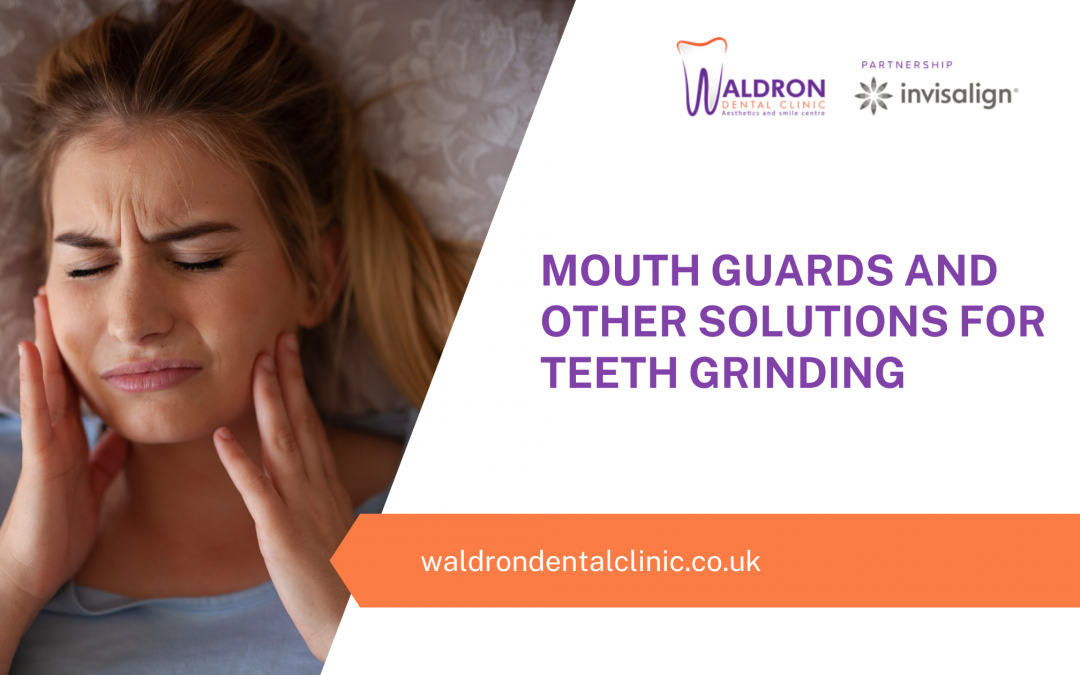The habit of teeth grinding is a common problem that affects over 10% of the British population, as per the British Bruxism Association. If you wake up with sore facial muscles and pain in your teeth, you might be grinding your teeth in sleep. But, there is no need to worry; teeth grinding, also known as bruxism, is a treatable condition. If you’re interested in learning more about teeth grinding and how to get rid of this problem, this article is for you. So, read on!
How Do I Stop My Jaw From Clenching?
Teeth grinding and jaw clenching can seriously affect one’s dental health and physical well-being. That is why these conditions must be treated promptly once diagnosed. The first step in the management of jaw clenching and teeth grinding is visiting an expert dental professional. Your dentist will perform a detailed clinical examination to identify the underlying cause of the problem. Based on the diagnosis, your dentist will recommend a suitable treatment option.
Why Does Grinding One’s Teeth Cause Toothache?
People who grind their teeth often wake up with aching teeth. Have you ever wondered why this happens? This is because when one grinds their teeth, it puts excessive pressure on them as well as the jaw joints. So, if one grinds their teeth throughout the night, it will result in unnecessary pressure on the tooth roots, which will also be transferred to the underlying jawbone. During this process, the periodontal ligament, a tissue that suspends our teeth in their socket, is also put under a lot of pressure, triggering the nerve endings and causing pain.
What Is The Treatment For Teeth Grinding For Adults?
The treatment of bruxism involves identifying the underlying cause. In most cases, dentists prescribe mouthguards to prevent damage to the teeth. A mouthguard is an appliance worn over the teeth and it protects the teeth from the unwanted pressure exerted on them due to grinding. If the underlying cause of bruxism is misaligned teeth, your dentist will realign them with braces or Invisalign aligners. Finally, if the cause of teeth grinding is due to stress or anxiety, behavioral modification therapies may be recommended for management.
What Medications Do You Recommend For Bruxism?
In some cases, medical professionals consider medications to treat bruxism. Some of these are:
- Muscle Relaxants – these medications help in relieving the spasm of facial muscles after constant jaw clenching and teeth grinding.
- Botulinum Toxin – a botox injection may help some patients of bruxism who do not respond to other treatments.
- Anti-anxiety Medication – individuals who grind due to stress or anxiety may benefit from anti-anxiety medications.
What Are Some Ways To Stop Night Teeth Clenching?
Night-time teeth grinding is a type of bruxism that occurs throughout night, while one sleeps. This type of bruxism is more dangerous than the one that only occurs during daytime, mostly due to anxiety or stress. Some ways to prevent night-time teeth grinding are:
- Occlusal splints or nightguards
- Braces or Invisalign aligners for realigning the teeth
- Mandibular advancement devices (MADs)
- Behavioural therapies such as hypnosis or cognitive therapy
Do Mouth Guards Work For Teeth Grinding?
A nightguard is a modified form of a mouthguard whose function is to protect the teeth from wear while one grinds their teeth in sleep. Mouthguards or night-time mouthguards are very effective in managing teeth grinding, as they form a physical barrier between the upper and lower teeth. So when one grinds their teeth, the mouth guard prevents damage to them. Otherwise, long-term teeth grinding can lead to complications such as tooth wear, sensitivity, dental cavities, and temporomandibular joint disorders. So yes, mouthguards do work for teeth grinding.
How To Sleep With A Mouthguard For Bruxism?
A night-time mouthguard is an appliance made of plastic resins. When used to manage tooth grinding, it is worn over the teeth. However, it may feel uncomfortable to wear during the initial few days and may also transiently affect one’s speech. However, this discomfort will go away in a few days, as the oral cavity becomes accustomed to the new appliance. So, after a few days of wearing them, you won’t have any problem sleeping while wearing your nightguards.
Do I Really Need A Night Guard For Bruxism?
A nightguard is a symptomatic treatment option for bruxism, meaning that it will only prevent damage to the teeth and may not necessarily treat the underlying cause. The actual treatment of bruxism depends on the underlying cause, such as occlusal splints, mandibular advancement devices, orthodontic treatment, or even orthognathic surgery. However, mouth guards are still one of the most effective options for reducing long-term complications of teeth grinding. That is why, dentists use mouth guards as the first step in treating teeth grinding.
When considering using mouthguards for bruxism, there are several things one must take care of. The most important among them is to use a custom-made mouth guard; you may find numerous stock, “boil-and-bite” nightguards in the market. However, they don’t fit well on one’s teeth and will not function well. On the other hand, if you get your mouth guards made by a qualified and experienced dentist, they will make them precisely according to the size of your teeth, ensuring that they perform their job well.
If you are looking for a mouthguard dentist in your area, Waldron Smiles should be your first choice; where we offer high-class dental services for your entire family under one roof. So, please book your appointment with us today and let us give you a beautiful smile and a healthy set of teeth.








